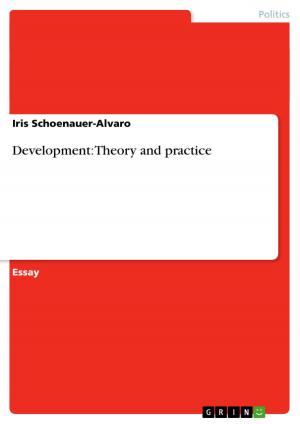American Deathways: The Meaning of Death in the American Indian Society
Nonfiction, Entertainment, Drama, Anthologies| Author: | Claudia Casagrande | ISBN: | 9783638121071 |
| Publisher: | GRIN Publishing | Publication: | April 16, 2002 |
| Imprint: | GRIN Publishing | Language: | English |
| Author: | Claudia Casagrande |
| ISBN: | 9783638121071 |
| Publisher: | GRIN Publishing |
| Publication: | April 16, 2002 |
| Imprint: | GRIN Publishing |
| Language: | English |
Seminar paper from the year 2000 in the subject American Studies - Culture and Applied Geography, grade: 1,0 (A), LMU Munich (American Cultural History), course: American Cultural History, 26 entries in the bibliography, language: English, abstract: Introduction To examine the meaning of death in the American Indian society, it is neces-sary to know about the general facts of American Indians. First of all, it is not possible, to write about any topic concerning ' the American Indian society', because there is not one single culture for all those different American Indian nations. The following paper uses examples and explanations from all Indian tribes and, even tough there is a huge diversity, the common endured history and today's American Indian inner fights between past and tradition unite all North American Indians to some kind of 'American Indian society.' To approach the topic of death after common information, a focus on North American Indian statistics concerning death will follow. These statistics will show the differences in life expectations literally and metaphorically. Whereas some specific forms of American Indian death, like infanticide, disappeared through the centuries, others, well known likewise in 'white' and 'black' society, such as homicide and suicide, changed their causes, but consist within and outside the reservation boundaries. As the causes of death altered since the colonization of America, death has also become a new face for the American Indians. Skirmishes between tribes changed to extinguishing wars between 'new' Americans and 'native' Americans. The surviving American Indians were forced to leave their homelands and move to special reservation areas. Thereby, the traditional death rites modified through a change of living conditions, surroundings, and environment. To recall all the gathered aspects of 'American Indian death ways', the Na-vajo nation as today's largest American Indian tribe, will serve as example to re-view and explain old rites, changes their gone through, and history's effects on their present day appearance. At the end of the journey through various aspects of the meaning of death for the American Indian society, examples from four American Indian authors shall highlight the importance of death as well in American Indian daily life, as in their history and their philosophy. [...]
Seminar paper from the year 2000 in the subject American Studies - Culture and Applied Geography, grade: 1,0 (A), LMU Munich (American Cultural History), course: American Cultural History, 26 entries in the bibliography, language: English, abstract: Introduction To examine the meaning of death in the American Indian society, it is neces-sary to know about the general facts of American Indians. First of all, it is not possible, to write about any topic concerning ' the American Indian society', because there is not one single culture for all those different American Indian nations. The following paper uses examples and explanations from all Indian tribes and, even tough there is a huge diversity, the common endured history and today's American Indian inner fights between past and tradition unite all North American Indians to some kind of 'American Indian society.' To approach the topic of death after common information, a focus on North American Indian statistics concerning death will follow. These statistics will show the differences in life expectations literally and metaphorically. Whereas some specific forms of American Indian death, like infanticide, disappeared through the centuries, others, well known likewise in 'white' and 'black' society, such as homicide and suicide, changed their causes, but consist within and outside the reservation boundaries. As the causes of death altered since the colonization of America, death has also become a new face for the American Indians. Skirmishes between tribes changed to extinguishing wars between 'new' Americans and 'native' Americans. The surviving American Indians were forced to leave their homelands and move to special reservation areas. Thereby, the traditional death rites modified through a change of living conditions, surroundings, and environment. To recall all the gathered aspects of 'American Indian death ways', the Na-vajo nation as today's largest American Indian tribe, will serve as example to re-view and explain old rites, changes their gone through, and history's effects on their present day appearance. At the end of the journey through various aspects of the meaning of death for the American Indian society, examples from four American Indian authors shall highlight the importance of death as well in American Indian daily life, as in their history and their philosophy. [...]















